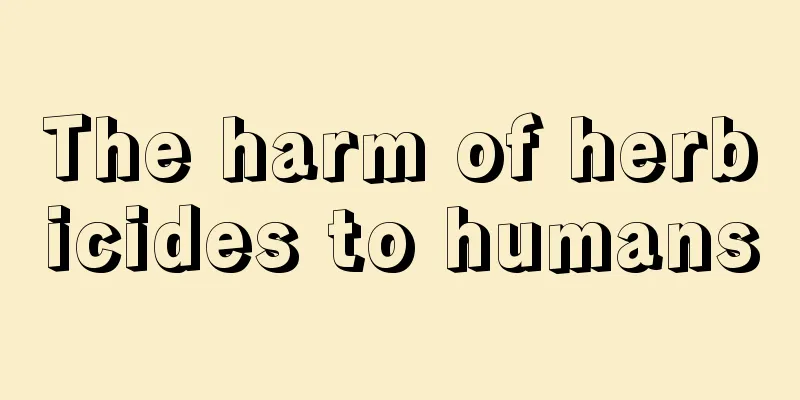The harm of herbicides to humans

|
Nowadays, farmers use herbicides to remove weeds when growing crops. Because if the grass grows in large quantities, it will take away nutrients from the crops, making it impossible for the crops to grow normally. Herbicides can eliminate most of the grass in the fields. Herbicides are very toxic, so human body should try to avoid contact with herbicides. So, what harm do herbicides do to humans?
1. The symptoms of systemic poisoning caused by various routes of absorption are similar, but the symptoms of poisoning caused by field spraying are relatively mild and the probability of lung damage is relatively low. 2. Local irritation symptoms 1) Skin contamination can cause contact dermatitis and even burns, manifested as erythema, blisters, ulcers and necrosis. Nails may also be severely damaged or fall off. Oral poisoning may also cause erythema. 2) Eye pollution causes symptoms such as photophobia, tearing, eye pain, conjunctival congestion and corneal burns.3) Inhalation of the respiratory tract may cause nosebleeds, nasopharyngeal irritation symptoms (sneezing, sore throat, congestion, etc.) and irritating cough. 4) Ingestion by mouth may cause corrosion and ulceration of the oral, throat and esophageal mucosa. 3. Systemic signs of poisoning affect multiple organ systems. Except for pulmonary edema and hemorrhage that occur quickly after accidental oral ingestion of large amounts, most of the symptoms develop gradually. Necrosis of the lungs, kidneys, liver, heart and adrenal glands will occur within about 1 to 3 days, and fever may occur during the course of the disease. 4. Digestive system Nausea, vomiting, abdominal pain, diarrhea and bloody stools appear in the early stages. After a few days (about 3 to 7 days), jaundice, abnormal liver function and other liver damage symptoms appear, and even liver necrosis may occur. A case of oral poisoning death from acute liver necrosis was reported in Dalian, China. 5. Urinary system Symptoms of bladder irritation such as frequent urination, urgency, and pain when urinating, abnormal urine test results, changes in urine volume, and even acute renal failure may occur, usually 2 to 3 days after poisoning.
1. Choose the right herbicide Different crops have different sensitivities to different herbicides. Therefore, when choosing a herbicide, you must be aware of its characteristics and performance to see whether it is suitable for the crops that need to be protected. 2. Use herbicides correctly 1) Strictly follow the dosage and concentration instructions on the herbicide instructions. Do not increase the dosage and concentration without authorization, and spray evenly to prevent local crop damage due to excessive dosage and concentration of herbicides. 2) The sprayer that has been used with herbicides must be cleaned. First rinse it with clean water, then wash it repeatedly with soapy water or 2-3% alkaline water several times, and finally rinse it with clean water. |
<<: The hazards of artificial stone
>>: The hazards of artificial rainfall
Recommend
What factors are conducive to radiotherapy for cervical cancer
In recent years, the incidence of cervical cancer...
How to remove something stuck in teeth
We need to eat a variety of things every day, esp...
Is a ruptured lip frenulum harmful? How to deal with it?
The lip frenulum is a connecting band on the uppe...
What are the symptoms of Qi and blood deficiency?
The problem of both qi and blood deficiency must ...
What to do with mild dry eyes?
Mild dry eye syndrome should be taken seriously, ...
How often should the blood cup be removed?
Many people usually have the habit of cupping, bu...
What should you pay attention to in your diet to prevent liver cancer? To prevent liver cancer, do 4 things to eat and 4 things not to eat
A survey in China shows that one in every 12 Chin...
How much does it cost to check for nasopharyngeal cancer
Patients with nasopharyngeal cancer should not on...
Can soaking your feet in salt water cure athlete's foot?
Soaking your feet every day is the simplest way f...
What principles should be mastered in the treatment of intestinal spasm
Intestinal spasm is a relatively common disease a...
Why do feet smell if there is no athlete's foot
Many people do not have athlete's foot, but t...
Does it hurt to do a gastroenteroscopy?
For patients with gastrointestinal discomfort, if...
How syphilis is transmitted
When it comes to infectious diseases, I believe m...
The Dos and Don'ts of Diet for Skin Tumors
Skin tumors are a type of malignant tumors that o...
What will happen if amblyopia is not treated
Most children nowadays like to play with electron...









